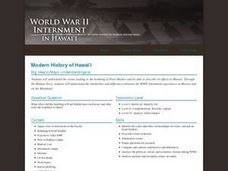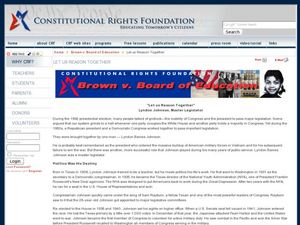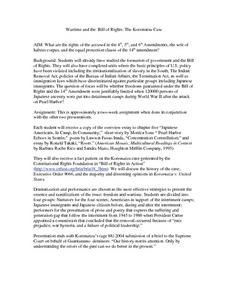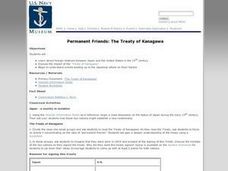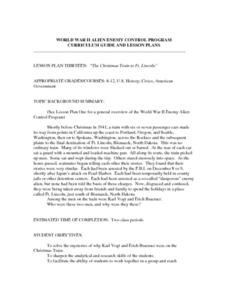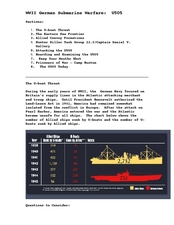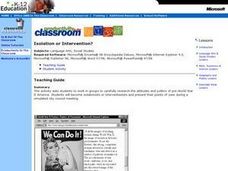Curated OER
World War II: Modern History of Hawaii
Learners examine world geography by viewing a documentary film in class. For this World War II lesson, students discuss the role Hawaii played in the great battle and what type conflicts happened among the island chain. Learners view a...
Curated OER
Art and Propaganda
Students examine the types of propaganda used throughout World War II. In groups, they view examples of different posters and artwork used to identify the human emotions the government was trying to appeal through. They develop their...
Curated OER
Letters from the Japanese American Internment
Students explore the concept of Japanese internment. In this Japanese internment lesson, students examine primary sources that enable them to discover what internment camp life was like and its implications, Students write their own...
Curated OER
"Let us Reason Together" Lyndon Johnson, Master Legislator
Students explore the contributions of Lyndon B. Johnson. In this congress lesson, students listen to their instructor lecture on the prowess of Lyndon B. Johnson's legislative skills. Students respond to discussion questions connected to...
Curated OER
Wartime and the Bill of Rights: The Korematsu Case (Lesson 2)
Twelfth graders review how the government and Bill of Rights came into effect. Using primary source documents, they discuss if Japanese rights were violated when they were placed in internment camps after the bombing of Pearl Harbor. ...
Curated OER
Wartime and the Bill of Rights: The Korematsu Case
Twelfth graders work together in groups to examine the discrimation Japanese Americans felt after the bombing of Pearl Harbor. Using primary source documents, they analyze and discuss the case of Fred Korematsu who was placed in an...
Curated OER
Democracy
Eleventh graders examine the denial of rights to individuals in the United States. In this American Government lesson, 11th graders study President Roosevelt's Day of Infamy speech. Students create a presentation on the denial of...
Curated OER
Where in the World War? Mapping the Geography of D-Day
Students examine how to read maps for historical information. They listen to a lecture on the history of D-Day, analyze a historical map of the invasion of Normandy, and answer discussion questions.
Curated OER
The "Yellow" Peril
Young scholars discuss what happened on the west coast of the United States in 1942 from the perspective of either Japanese and Japanese Americans or their non-Asisan neighbors. They watch a video, where they are aware of both sides of...
Curated OER
Mapmaking: Colorado Quarter Reverse
Pupils examine the Colorado quarter reverse and draw symbols of the state's land and water features on maps. Using copies of the Colorado reverse, they color the coin design. They list reasons for the state's motto of "Colorful Colorado"
Curated OER
Japanese Internment Camps in the US During World War II
Eighth graders analyze the impact of the Japanese/American conflict during World War II on the Japanese American population and evaluate the consequences of government action regarding international conflict. Students demonstrate their...
Curated OER
Turning the Tide in the Pacific, 1941-1943
Students analyze the Japanese strategy for the Pacific and compare it to the Allied strategy. They identify on a map the sites that were important the early war in the Pacific, and identify key military engagements.
Curated OER
Turning the Tide in Europe, 1942-1944
Learners identify the reasons why the U.S. government decided to focus on the defeat of Germany and Japan and assess the wisdom of this decision. They analyze the magnitude of the U-Boat threat in the Atlantic.
Curated OER
Vietnam War: Kennedy Assassination
Students determine how the Kennedy assassination impacted the United States and, more specifically, the Vietnam War. In this 20th century American history lesson, students read books and view video clips of the event and then write...
Curated OER
Ethnic Groups in World War II
Students discuss the contributions of various ethnic groups during World War II prior to visiting the George Bush Gallery of the Pacific War. After the visit, they interview veterans about prejudice during the war or listen to a guesst...
Curated OER
The Christmas Train to Ft. Lincoln
Students solve the mysteries of why Karl Vogt and Erich Braemer were on the Christmas Train. They review the definitions of the terms constitutional, human rights, due process, discovery, and the writ of habeas corpus. They review the...
School Improvement in Maryland
Executive Order
After reading information about Executive Order #9066, class members assume the voice of an 18 year-old Japanese-American born in California and placed in an internment camp. Individuals then craft a letter to President Roosevelt...
Curated OER
WWII German Submarine Warfare: U505
High schoolers research how the capture of a German submarine by the Allies affected the outcome of WWII. In this WWII lesson, students complete a KWL chart. High schoolers research primary source documents online and answer discussion...
Scholastic
The Rise of Railroads: Illinois
Railways not only cross the US, but they are also intertwined with the history of America. Using a timeline format, individuals explore the connections between major events in American history—such as the Civil War—and the rise of the...
National Endowment for the Humanities
How to Win a World War
High schoolers are have begun to learn the art of diplomacy with each other, but do they understand how diplomacy works at a global level? The second in a series of four lessons, guides scholars in evaluating primary sources. The why...
Curated OER
Baseball Saved Us Teacher’s Guide
Students read the book "Baseball Saved Us" and respond to the story through writing activities. In this reading lesson, students create a chart of events which they predict will take place in the story. Students then use their chart as...
Curated OER
Isolation or Intervention?
Students research the attitudes and politics of pre-World War II America. They become isolationists or interventionists and present their points of view during a simulated city council meeting.
Curated OER
The War: Japanese Americans and Internment
High schoolers examine the experiences of Japanese-Americans at the beginning of World War II in America. After watching an excerpt from "The War", they answer reflection questions about the Japanese being put into internment camps. In...
Curated OER
The Great Debate: Internationalists vs. Isolationists
Students examine the opposing arguments of the isolationists and internationalists in 1941. In this debate lesson plan, the students are divided into two opposing groups representing a position in a live, in- class debate. After the...


